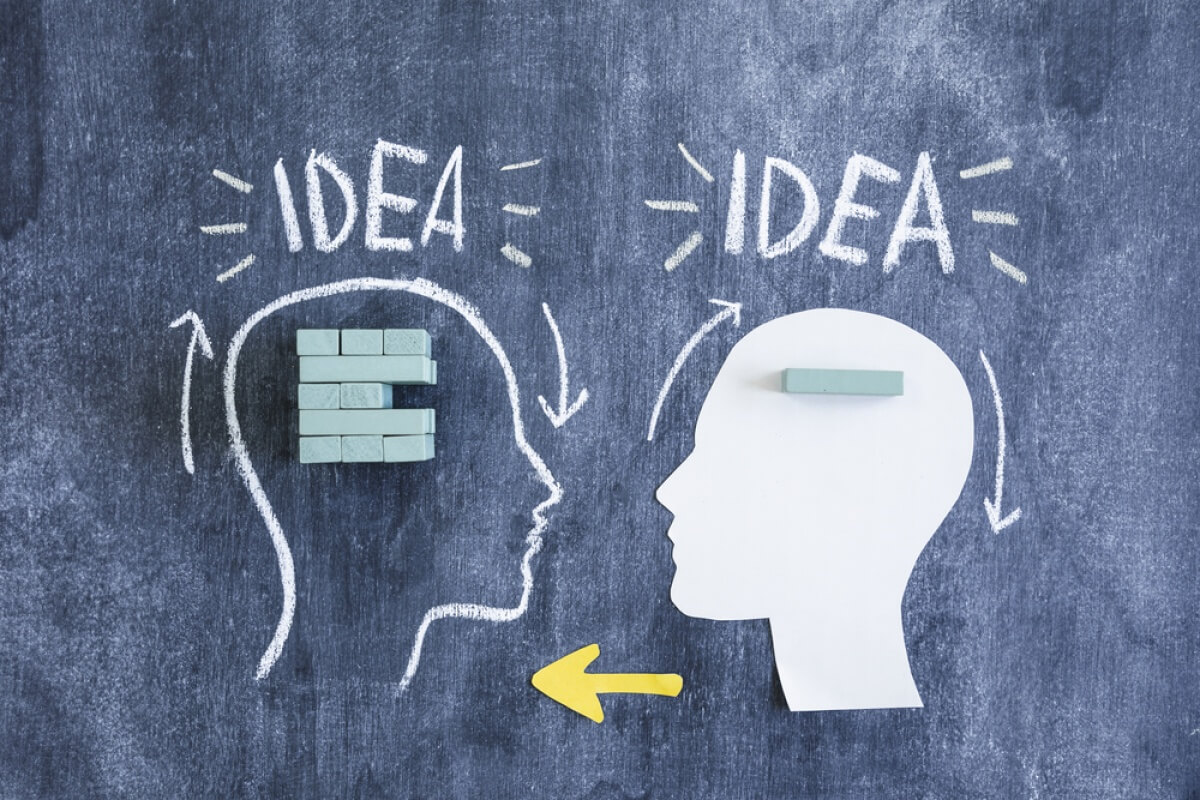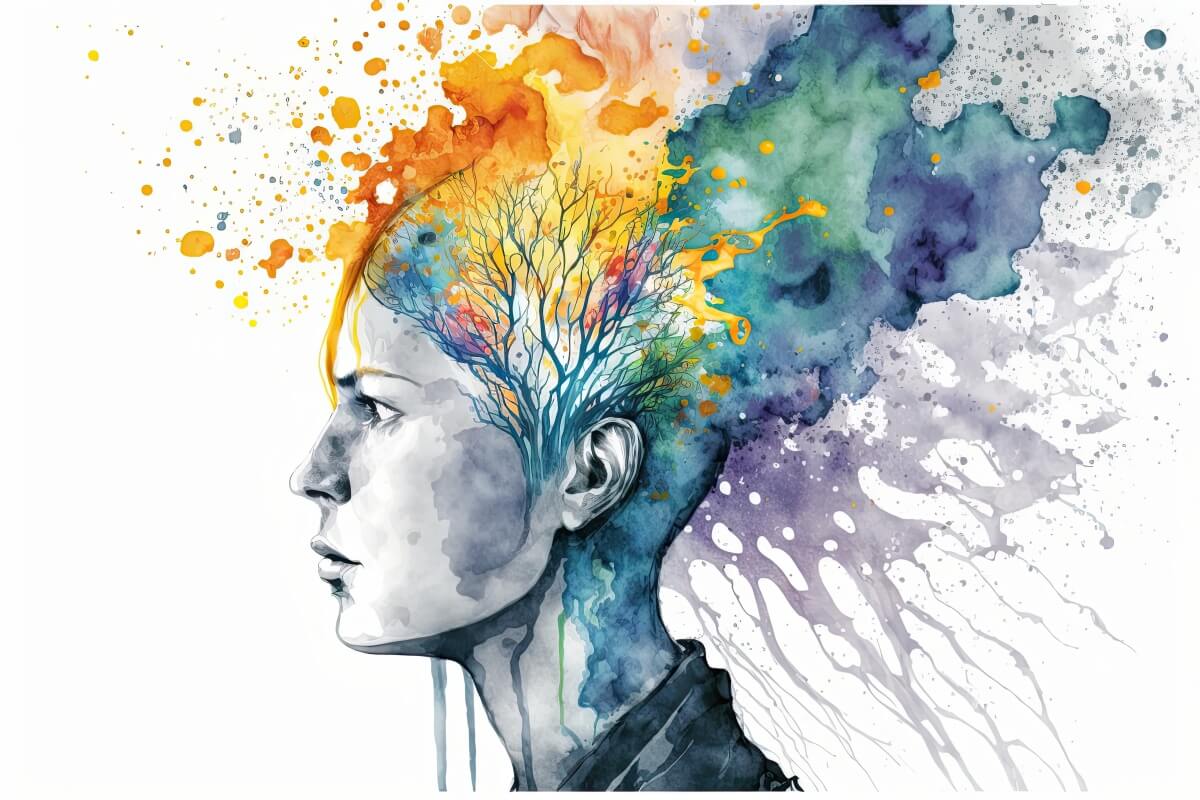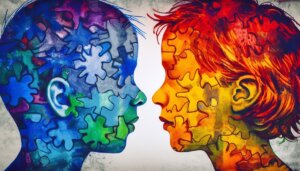Table of Contents
Development of Emotional Intelligence in Childhood

Understanding and Expression of Emotions in Childhood
Emotional Intelligence (EI) is not just a fixed measure but an evolving ability that fundamentally affects human behavior and success. The process begins in the earliest stages of life and impacts throughout the Emotional Intelligence lifespan. From the carefree Emotional Intelligence childhood to adulthood, EI is in constant flow and growth.
Development of Emotional Intelligence in Childhood
Toddlers often express their first emotions through simple reactions like smiling or crying. As they acquire language skills, they begin to articulate their emotional world more intricately. Interaction with caregivers plays a key role here. Parents and educators who recognize and name the children’s emotions make a crucial contribution to the Emotional Intelligence growth.
- A child who experiences comfort in sadness and whose joy is shared learns that emotions are not just personal experiences but can also be understood and appreciated interpersonally.
- In games like “imitating faces,” where children are encouraged to portray various emotions, skills such as recognizing and interpreting feelings are deepened.
- Parents who regularly discuss and name emotional states significantly contribute to the development of Emotional Intelligence over the lifespan of their children.
Key Elements for Understanding Emotions in Childhood
Like a plant that thrives with proper care, EI also needs an environment that fosters its growth. For further development, certain building blocks are essential:
- Modeling emotions by adults, which helps children to experience a wide range of feelings and learn forms of expression.
- An open communication about feelings, showing children how emotions can be put into words and understood.
- Social interactions in which children not only practice their own emotions but also learn to respect and respond to the feelings of others.
The development of EI in childhood lays the foundation for many aspects of later life, such as relationship skills, empathy, and social behavior. It is particularly important to convey to children that emotions are diverse and normal and that a healthy approach to them can be learned. Thus, Emotional Intelligence development naturally expands, forming a robust basis for the challenges and opportunities that await them later in life.
Empathy and Social Skills in Schoolchildren
Emotional intelligence development during school age is crucial for the development of a child’s personality and their success in interpersonal interactions. During this stage of life, the ability to empathize, which is a key component of emotional intelligence, forms and has far-reaching impacts on social skills.
Empathy as a Bridge to Community
Children who learn to empathize open up a world of better collaboration. In projects and recess games, empathy and emotional intelligence play a central role throughout life, as children can better interpret the moods of their classmates and teachers and respond sensitively.
- When sharing toys, empathetic children recognize sadness or frustration in others and proactively offer solutions.
- In group discussions, they often contribute to a more constructive and peaceful dialogue through their empathetic skills.
- In sports, they learn the importance of team spirit and fair play, which strengthens their emotional bonds and social network.
Impact on Academic Performance
It is evident that Emotional Intelligence Development also influences academic performance. Children who are able to manage their own and others’ emotions often show better concentration and persistence in school tasks and exams.
- These children can better cope with stress and exam anxiety, as they understand and regulate their emotions.
- They are often more engaged in class because they appreciate the efforts of teachers through empathy.
- Additionally, their increased understanding of group dynamics leads to more efficient participation in group work and projects.
A Guide for Parents and Teachers
The role of guardians and educators is indispensable in promoting Emotional Intelligence from Childhood to Adulthood. Adults can help children develop their emotional and social skills through targeted feedback and by modeling empathetic behavior.
- By acknowledging and discussing emotional experiences, children can better understand and express their emotional world.
- Adults can use conflict situations as learning opportunities to teach children constructive conflict resolution.
- The introduction of role-playing and group activities also promotes understanding of social roles and perspective-taking.
Promoting empathy and social skills in school-aged children is an investment in the social health of our society. Children who possess pronounced emotional intelligence grow into adults capable of responding constructively and compassionately to life’s challenges.
Emotional Intelligence in Adulthood

Self-awareness and Regulation in the Professional World
In the professional world, it’s not just technical knowledge that counts, but also mastery over one’s own emotions – a central discipline of Emotional Intelligence. Developing Emotional Intelligence throughout life means a continuous understanding and improvement of self-awareness and self-regulation.
The Significance of Self-Awareness
With increasing development of Emotional Intelligence, individuals recognize their emotional states more precisely and understand their impact on their thinking and actions. In the work context, this self-awareness allows a leader to effectively manage stress. Instead of impulsive reactions to internal team conflicts, they use their Emotional Intelligence to find solutions. They understand how to interpret both factual and emotional signals in their communication. Thus, potential tensions are recognized early and addressed proactively.
Imagine a project manager who realizes the deadline is pressing and the team is worried. Instead of panicking, they acknowledge their own concern, set priorities, and convey trust in the team’s collective problem-solving ability.
Strategies for Self-Regulation
Growth in Emotional Intelligence is particularly evident in challenging moments. A key strategy of self-regulation is the conscious control of one’s own reactions. This also involves postponing short-term impulses to reach long-term goals or to preserve collegial relationships.
For example, an employee, who is hurt by critical feedback, can learn to control their initial emotional response. Instead of reacting confrontationally right away, they use the development of their Emotional Intelligence to view the situation from a different perspective and draw constructive conclusions.
- A good approach is the technique of reflective listening, to protect one’s perspective from premature conclusions.
- Another is practicing mindfulness techniques, which teach one to observe emotional reactions rather than being overwhelmed by them.
- The ability for self-motivation, even during difficult phases, is another expression of emotionally intelligent self-regulation.
A lifespan of Emotional Intelligence means that these abilities are developed and refined from childhood to adulthood. In professional matters, where pressure and complexity are omnipresent, they provide an invaluable advantage that decisively contributes to success and satisfaction. The continuous engagement with one’s own emotions and their management is thus a lifelong process that bears fruit in professional life.
Relationship Competence and Team Skills in Private and Professional Contexts
Emotional intelligence develops over the lifespan and affects how we interact with others, from childhood through to adulthood. The ability to recognize, understand, and manage emotions in oneself and others is a crucial factor for relationship skills and team competence in both private and professional contexts.
The Fundamentals of Emotional Intelligence
A core component of emotional intelligence is self-awareness. This enables a person to recognize their own emotions and understand their impact on behavior and thinking. Those who are strong in this area can better assess personal strengths and weaknesses, thereby fostering personal growth.
- A manager who recognizes their frustration in stressful situations can consciously take timeouts to act more calmly and effectively.
- A mother losing her patience might take deep breaths and speak with a soothing voice instead of shouting.
- A team member who notices their nervousness before presentations can specifically apply relaxation techniques.
Communication and Social Skills
Besides self-awareness, the ability to self-regulate is another important aspect of emotional intelligence. Those with high self-regulation can control impulses and act thoughtfully. The social component includes empathy and the ability to maintain relationships.
- Empathetic leaders recognize the needs of their employees and can provide support, which leads to increased employee satisfaction and retention.
- Parents who empathize with their children promote a trusting and open relationship.
- Friends who respect and support each other’s emotions build deeper and more lasting bonds.
In all these examples, the development of emotional intelligence plays a central role, as it allows dealing with emotions in ways that strengthen relationships. A high level of emotional intelligence enables constructive conflict resolution and more effective teamwork. Awareness of one’s own emotions and those of others can lead to empathetic responses, contributing to harmonious interactions.
The growth of emotional intelligence across the emotional intelligence lifespan often shows a trend: With increasing life experience, people learn to better manage their feelings and those of others. The ability to decode emotional signals and respond accordingly improves, which in turn leads to more mature and stable relationships.
However, it is important to note that the development of emotional intelligence is not an automatic process. It requires conscious efforts, reflection, and possibly the support through coaching or therapy to foster and enhance it. Emotional intelligence is a skill that can and should be trained and refined throughout life. By promoting it, not only is individual well-being enhanced, but also the social framework in which we live and work.
Summary
Emotional Intelligence (EI), far more than just a buzzword, is a skill that significantly influences human behavior throughout the lifespan and can be continuously developed.
Foundations and Development in Childhood
From the early years of life, the groundwork for Emotional Intelligence Development is set. Through interactions with caregivers who recognize and name emotions, children learn to better understand and articulate their own feelings.
- These interactions help children understand that emotions are not only experienced internally but can also be shared and understood.
- Playful activities such as mimicking facial expressions deepen their understanding of a wide range of emotions.
- Parents who discuss emotional worlds with their children actively promote their Emotional Intelligence Growth.
Emotional Intelligence throughout the Lifespan is particularly important in a school context, where children develop empathy and strengthen social skills that are necessary to constructively collaborate with peers and teachers.
Emotional Intelligence and Social Interaction
School is a significant place where children learn to manage their own emotions and those of others. Those who act with emotional intelligence can better handle stress, thereby showing improved academic performance and concentration.
- A deep understanding of empathy and emotional responses leads to more constructive group work and enhanced team competence.
- Teachers and parents, acting as emotional guides, support children in developing a pronounced Emotional Intelligence Growth.
Over time, children’s EI grows as they learn to consciously regulate their emotions and use them constructively in their social environment. Emotionally intelligent adults also have an advantage in the working world, as they are capable of handling conflicts in a solution-oriented manner and strategically forming their social relationships.
Improving Emotional Intelligence over the Lifespan is a continuous process that requires self-awareness and regulation and does not occur without support. Through training, reflection, and possibly professional help, the full potential of EI can be realized, benefiting not only the individual but society as a whole.
FAQ – Emotional Intelligence Across the Lifespan
How can emotional intelligence be nurtured from childhood through adulthood?
Emotional intelligence continually develops through conscious reflection and interaction, beginning in childhood where parents and educators teach emotion names and expressions, and model empathetic behavior. In adult life, it is then each individual’s task to strengthen and expand their own emotional competence through continuous feedback, self-reflection, and interpersonal experiences, such as learning to appropriately regulate and communicate emotional responses in various contexts.
What factors contribute to the development of emotional intelligence from childhood to adulthood?
The development of emotional intelligence is significantly influenced by social interactions and education; as children learn to recognize and appropriately express their own feelings, they also better understand the emotions of others. Life experiences, education, and personal determination play a crucial role in enhancing the ability to reflect on and regulate emotional responses, which is essential for adaptability in adult life.
How can adults support and promote the development of emotional intelligence in children?
Adults can foster emotional intelligence in children by teaching them to recognize, understand, and appropriately respond to emotions. It is helpful when they lead by example, by consciously perceiving and expressing their own emotions and being empathetic to the children’s emotions. Additionally, it is important to educate children in social skills and show them how to resolve conflicts and maintain relationships so that they learn to successfully apply their emotional competencies in everyday life.








